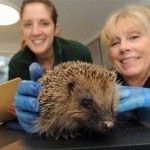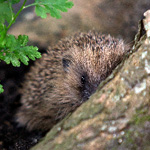Hedgehog Hospital Project
SWCC runs an onsite Hedgehog Hospital for the treatment and rehabilitation of hedgehogs brought in by the public before release back into the wild. Hedgehogs are brought in from across Hertfordshire and Cambridgeshire, as well as from surrounding areas, such as Greater London, Suffolk and Bedfordshire.
The project is currently run by a small number of permanent hospital staff, volunteers, animal keepers and SWCC Trustees. The Hospital educates visitors to the Wildlife Park about the project and the species through interpretation displayed on the building, this website and through a programme of working with local schools.
If to find an injured, sick or orphaned then hedgehog please call our Emergency Hospital Line on: 07947 361187
Hedgehog Rehabilitation and Conservation
 The European hedgehog (Erinaceus europaeus), is not formally protected, but is recognised of principal importance for conserving biodiversity under section 41 (England) of the NERC Act (2006). In the UK, research suggests a fifth of the population die out every four years. So the work of hedgehog rehabilitation may prove to be vital for the longterm survival of the population. In rural environments, threats to the species have been identified as directly or indirectly related to anthropogenically derived factors (such as habitat loss and fragmentation, pesticide use, road traffic) as well as natural impact (including predation and prey item availability).
The European hedgehog (Erinaceus europaeus), is not formally protected, but is recognised of principal importance for conserving biodiversity under section 41 (England) of the NERC Act (2006). In the UK, research suggests a fifth of the population die out every four years. So the work of hedgehog rehabilitation may prove to be vital for the longterm survival of the population. In rural environments, threats to the species have been identified as directly or indirectly related to anthropogenically derived factors (such as habitat loss and fragmentation, pesticide use, road traffic) as well as natural impact (including predation and prey item availability).
Successful rehabilitation and release can only be considered effective if the animals not only survive back in the wild, but also continue to breed and repopulate areas. This evidence can only be obtained from post-release monitoring techniques. Various release methods and sites can be compared for best practise for future releases. Additionally, monitoring the disease burden on wild populations will indicate future complications.
The SWCC Hedgehog Hospital intends that all it’s activities should be based on a sound scientific footing rather than driven solely by wishful thinking. The hospital’s aim is to integrate hedgehog rehabilitation with conservation, and to avoid rehabilitation practices that may conflict with the conservation of free-living hedgehog populations.
Clinical Activities at the Hospital
- Where possible hedgehogs presented to the hospital dead, or that die whilst in the hospital, are subjected to a post mortem examination to generate information on the conditions and diseases from which wild hedgehogs suffer. This information will help inform future rehabilitation efforts.
- Preserved examples of important ecto- and endo-parasites will be prepared as a teaching resource based at the hospital.
- Ectoparasites from hedgehogs admitted to the hospital will be collected, preserved, and when funds allow, investigated for the carriage of potential pathogens.
- Other non-invasive investigations into hedgehog diseases will be undertaken as time and resources allow.
- Publication of data generated by these research activities will be a priority.
Hospital Statistics
- 2011/12: 201 hedgehog admissions
- 2012/13: 367 hedgehog admissions
- 2013/14: 407 hedgehog admissions
- 2014/15: 562 hedgehog admissions
- 2015/16: 652 hedgehog admissions
- 2016/17: 639 hedgehog admissions
- 2017/18: 825 hedgehog admissions
- 2018/19: 495 hedgehog admissions
- 2019/20: 437 hedgehog admissions
- 2020/21: 294 hedgehog admissions (COVID-19 restrictions)
- 2021/22: 472 hedgehog admissions
- 2022/23: 324 hedgehog admissions
Total hedgehog admissions since opening: 5675
(Note all reporting runs on fiscal years, 1 April to 31st March)

